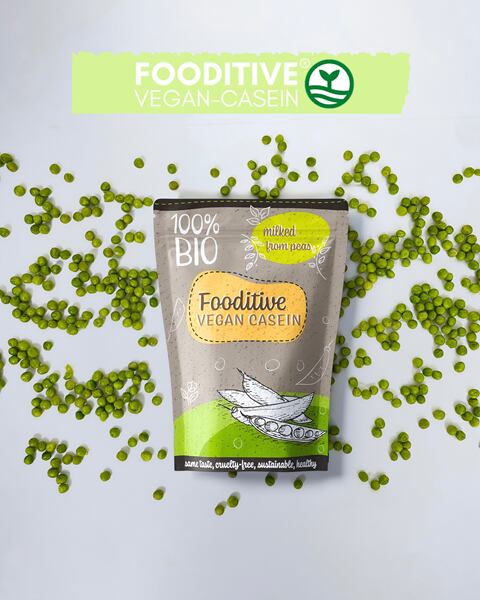Fooditive is on a mission to change consumer opinion towards genetically modified organisms (GMOs), while at the same time, encouraging a move away from animal agriculture.
One key barrier for consumers in adopting a vegan diet, suggested Fooditive’s food scientist founder Moayad Abushokhedim, lies in taste and texture.
“The reason why a lot of people are not going to become vegan is because [current alternatives] lack the taste and texture that they’re used to,” Abushokhedim, who serves as Fooditive’s CEO, told FoodNavigator.
“If we can provide that [taste and texture] using our vegan casein, we know quite well we are going to encourage a lot of [dairy consumers] to become more vegan. We are going to encourage them to use more plant-based ingredients.”
Mimicking dairy functionality
Fooditive is leveraging its unique fermentation process to develop the casein powder which it hopes will be a ‘game-changer’ in dairy alternatives. The company uses peas as the raw material. “The methodology is based on our unique fermentation ‘enzymology’ process, by simply using microorganisms, sugars and nutrients. And as we wanted to keep the price of the vegan casein affordable, we decided to use the peas,” said the CEO.
The key to producing the vegan casein was first to understand the formula of conventional dairy, explained the start-up.
“This helped the team to re-create an animal-free version of milk casein, by using fermentation and ensuring the process will be scalable for the food industry.”
Casein is made up of four major components: alpha-, beta-, gamma-, and kappa-casein. To begin with, Fooditive concentrated on recreating β-casein, however after further research, the team discovered they could create the same functionality for β-casein, κ-casein, α-S1-casein, and α-S2-casein.
The ingredient will be the first vegan casein available for all applications in the food industry, from yoghurt to creams, as well as cheeses with melting characteristics, Fooditive continued.

Responding to the demand for milk, while eradicating the ‘downsides’ of factory farming, and concerns surrounding lactose allergies, hormones, and antibiotics, is the start-up’s primary objective. “We believe in making milk protein that’s a little better for everyone,” said Abushokhedim.
Fooditive plans to launch its vegan casein onto the market in 2022.
Changing the conversation around GMOs
The start-up’s new ingredient is founded on GMO technology. Specifically, Fooditive is leveraging DNA-modified yeast, which the CEO explained is taking genetic modification to the ‘next step’.
The company is aware that GM has also been associated with negative consumer perceptions in Europe.
“We understand that the production of food-grade genetically modified organisms is subject to constant debate due to the combination of negative consumer perceptions and the distrust of conglomerates.

“Our aim is to change that by showing the food industry and the end consumers an innovative approach to create sustainable products,” said Fooditive product manager Niki Karatza.
The regulatory system in Europe presents another challenge in marketing the novel casein across the bloc.
“The European Food Safety Authority (EFSA) regulation is really strict in reference to marketing and actually taking a product like this to market,” Abushokhedim told this publication. “We have to [conduct] lots of clinical studies to show…this product is safe for human consumption.
“Don’t get me wrong, I think it’s amazing how EFSA ensures food safety, but at the same time, as a start-up we cannot afford to do the intense research they acquire.”
This may force Fooditive to look elsewhere outside of Europe for initial market entry.
“The US Food and Drug Administration (FDA) offers an open guide to make it a bit easier to enter the market with such a product, with easier requirements when it comes to the scientific research,” we were told.




